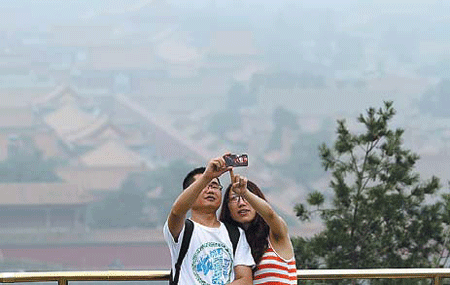Big smog in Beijing causes woes
Updated: 2013-07-02 08:03
By Wang Qingyun (China Daily)
|
||||||||
|
A young couple at Beijing's Jingshan Park take pictures of themselves during the weekend, with the smog-shrouded Forbidden City in the background. Zhuo Ensen / for China Daily |
People with respiratory issues usually get a break in the summer, but after Beijing's spell of smog in June, more and more are finding anything but relief.
Li Yanming, a doctor at the respiratory department at Beijing Hospital, said she has received calls from four asthma patients over the past three days, all complaining that their chronic disease is worsening. She said the heavy pollution in the capital could be exacerbating problems for asthma sufferers.
"Usually asthma becomes active during spring and autumn. Summer is a season where asthma can be controlled without medication. Their problems may have been caused by the pollution," Li said.
Zhang Shunan, vice-director of the lung diseases department at the China-Japan Friendship Hospital, said the number of patients he has seen has recently increased by 10 to 20 percent.
"Summer should be a season when there are fewer people with respiratory symptoms," he said.
People with sensitive and weak respiratory systems or respiratory diseases are more prone to weather changes, he said. Coughing, a scratchy throat and chest tightness usually occur for asthma sufferers when weather conditions worsen suddenly. Over the long run, he said, smog may cause severe chronic diseases such as lung cancer and chronic obstructive pulmonary disease.
Both Li and Zhang advise using masks, but added that only medical workers should wear the N95 mask made by 3M for long periods of time. The N95 mask can block fine particulate matter such as PM2.5, particles with a diameter of 2.5 micrometers or less, from entering the respiratory system.
"The mask makes it more difficult to breathe, and a majority of people can't bear it for a long time," Li said. "The most effective way is to cut down on outdoor activities."
Zhang warned that PM2.5 particulates is not the only pollutant in the atmosphere. Masks, he said, can help keep away pollutants larger than PM2.5.
Zhang Jinliang, a researcher with the Chinese Research Academy of Environmental Sciences, explained that besides PM2.5, the density of pollutants that are greater in size all rise when the atmosphere is heavily polluted.
wangqingyun@chinadaily.com.cn
(China Daily USA 07/02/2013 page4)
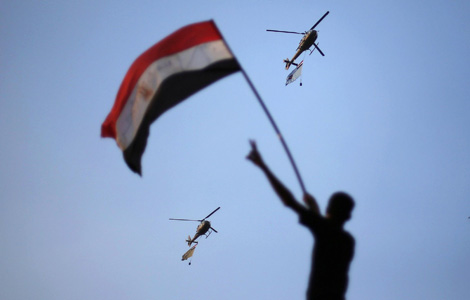
 Egypt army gives Mursi 48 hours to share power
Egypt army gives Mursi 48 hours to share power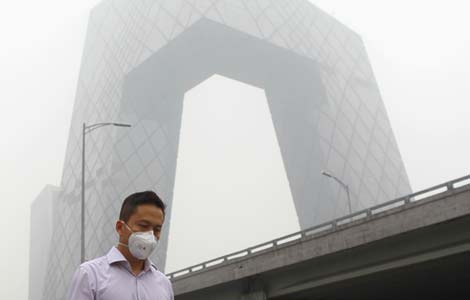
 No quick end in sight for Beijing smog
No quick end in sight for Beijing smog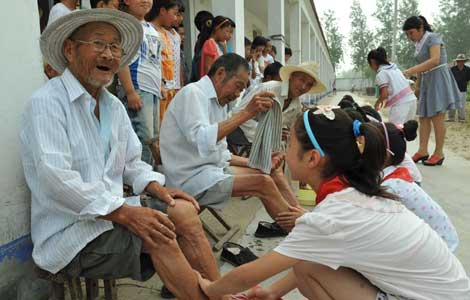
 New filial law sparks debate
New filial law sparks debate
 Bakelants claims Tour de France second stage
Bakelants claims Tour de France second stage
 2013 BET Awards in Los Angeles
2013 BET Awards in Los Angeles
 Gay pride parade around the world
Gay pride parade around the world
 Four dead in Egypt clashes, scores wounded
Four dead in Egypt clashes, scores wounded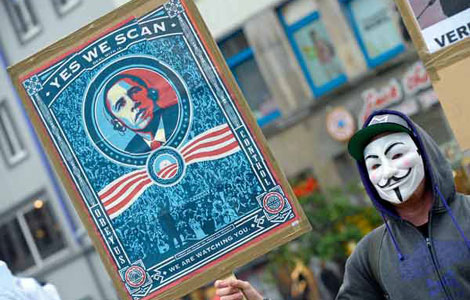
 New NSA spying allegations rile European allies
New NSA spying allegations rile European allies
Most Viewed
Editor's Picks

|

|

|

|

|

|
Today's Top News
Kerry hails China's denuclearization bid
19 firefighters killed in Arizona fire
Book reveals islands' true history
Tokyo warned not to resort to 'empty talk'
Snowden applies for Russian asylum
No quick end in sight for Beijing smog
New home prices defy curbs
Mandela 'still critical but stable'
US Weekly

|

|
